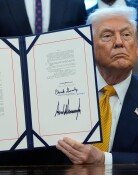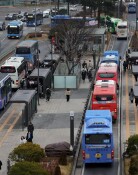Pyongyangs New Equidistant Diplomacy With China and Russia
Pyongyangs New Equidistant Diplomacy With China and Russia
Posted March. 20, 2005 22:08,
With the six-party talks to resolve the North Korea nuclear issue deadlocked for the long term, signs of subtle relationship changes among the participants are showing up.
In particular, North Korea, who once was unilaterally cut off from the rest in a five versus one situation, is receiving the spotlight with a new equidistant diplomacy, as it shows signs of restoring the tripartite alliance with Russia and China.
Meanwhile, with the outbreak of the Dokdo dominium conflict with Japan, Koreas relationship with Japan is in a crisis, and the Korea-U.S. relationship is also coarse with the alliance adjustment.
North Koreas New Equidistant Diplomacy
A foreign policy and security expert recently analyzed that Pyongyangs equidistant diplomacy that it carried out in the 1960s when the former Soviet Union and China fought for communist hegemony is re-emerging.
This is relevant to Pyongyangs aggravated isolation from its February 10 Statement declaring nuclear possession by its Foreign Office, which it made originally in order to secure an advantageous position in the resumption of the six-party talks issue.
Since then, North Korea has made friendly gestures to China and Russia and strived to find friends. To illustrate, National Defense Committee Chairman Kim Jong Il watched a performance by the Academy of Russian Ballet on February 17 as the first open international activity after the February 10 Statement.
On March 8, he made an abrupt visit to the Russian embassy in Pyongyang and boasted of his friendship with Russia abroad. Regarding such moves, a high-profile official in the Unification Ministry estimated, It is a struggle to break the countrys excessive dependence on China. Former Unification Minister Park Jae-gyu also explained the intimate Pyongyang-Russia relationship that the personal friendship between Kim Jong Il and Putin is stronger than ordinary people feel.
North Koreas approach to China as a way to increase its leverage by restoring the tripartite alliance is also extraordinary. As if to retrieve the fact that it did not notify China before making its Foreign Office statement, Chairman Kim Jong Il received Wang Jiarui, head of the International Liaison Department of the CPC, when he visited North Korea on February 19, and showed sincerity by conditionally promising to participate in the six-party talks.
On March 22, North Koreas Cabinet Minister Park Bong-Ju is scheduled to visit China as well.
Korean Diplomacy Up Against the Wall
Contrasting with North Koreas friend-seeking, South Koreas relationship with its existing friends is aggravating. Korea-U.S. and Korea-Japan diplomacy are all in a difficult situation.
Setting the reasons aside, Korea is embroiled in an emotional feud with Japan, which has to be an important supporter of the six-party talks in order for them to be successful. Its alliance realignment with the U.S. has also been burdensome. A government authority said, For Korea, who is pushing itself to isolation, Secretary Rices visit to Korea is an important agenda in which it can seek a breakthrough. The restoration of the Korea-U.S.-Japan alliance in the future is crucial.
taewon_ha@donga.com







